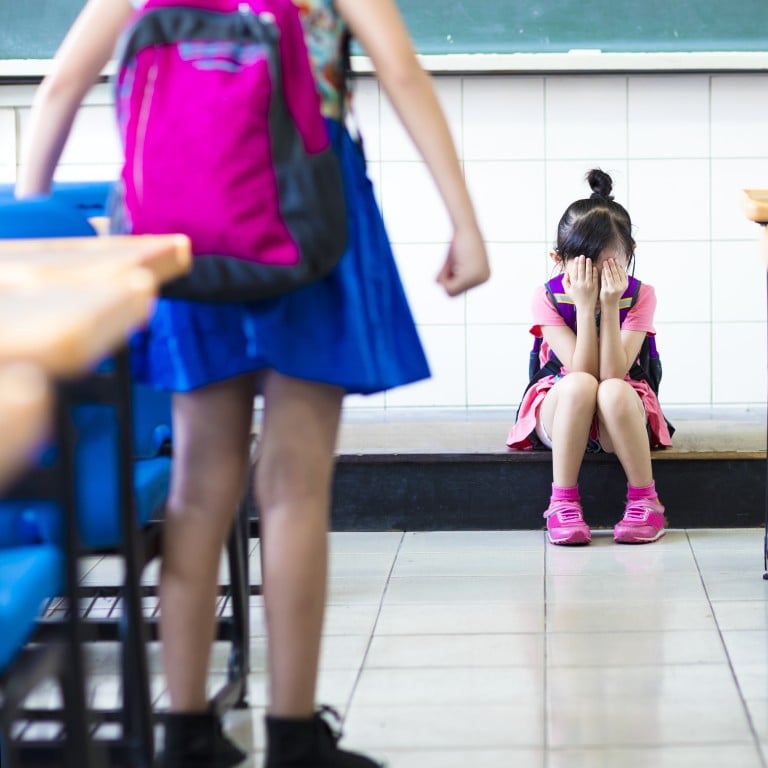
China moves to strengthen child protection laws with measures to help those at risk of abuse and cyberbullying
- Draft proposals would give state power to remove vulnerable children from parents or other guardians if they are deemed to be failing in their duties
- Legislation will include first measures to tackle online bullying and strengthen protections for those at risk of sexual or physical abuse
China is planning a major overhaul of its child protection laws including new safeguards against abuse and bullying.
It will also increase the authorities’ powers to step in when parents or other legal guardians are failing in their duty of care.
The proposed new amendments to the Minors Protection Law underwent their first review at a bimonthly session of the National People’s Congress Standing Committee, the country’s top legislative body, on Monday.
The proposals would add dozens of new articles to the law, first passed in 1991 and then amended in 2006, to address major issues such as sexual abuse and bullying as well as empowering the state to revoke guardianships from those failing to protect children’s welfare.
Under the amendment, county-level civil authorities or above will be able to act as temporary guardians for up to a year in cases where children are at risk of sexual abuse, serious violence, trafficking or being used to commit crimes, official news agency Xinhua reported.
Other scenarios where temporary state custody will be granted include cases when minors suffer serious harm or neglect from their parents or guardians or when they cannot be located by the authorities.
K-pop and f (x) star Sulli, who spoke out against cyberbullying, found dead in her home
Meanwhile, the draft also includes the first legal protections designed to prevent bullying – either physical or online.
Schools will be required to establish anti-bullying measures and train staff members to tackle the problem.
They will also be required to cooperate with the authorities to correct or punish bullies and work with the police in the most serious cases.
To tackle online bullying there will be a ban on posting words, images or videos that threaten, insult or attack children and maliciously distort or damage their images.
Underage victims of cyberbullying or their parents or guardians will also be able to ask internet service providers to delete the offending posts.
The China Youth Internet Use and Cyber Security Survey Report, published by the China Academy of Social Sciences in May last year, showed young people were the most vulnerable to online bullying with just over 71 per cent of the surveyed youngsters reporting they had been ridiculed or insulted online.
Another report by the academy published this year said that 28.9 per cent of teenagers reported violent or abusive comments online, with more than 45 per cent reporting threatening text messages or online postings.
Pregnant woman found dead with son ‘struggled with bullying and exclusion over his autism’
Sun Xuemei, co-founder of welfare group Girls’ Protection, welcomed the proposals and describing them as a “giant step forward”.
“Although the draft is not the final version, we have seen where the amendment is going,” she said. “While, there might still be difficulty in implementing the amended law, it is still a legal guidance and provides the legal foundation for protection of children’s rights.”
She said documents on revoking guardianship had been issued by the Supreme People’s Court in 2015, but it was a significant step to propose changes to the law.
“Many have been trying to push for the amendment and some articles, including putting sexual abuse in the draft. This is a giant step forward,” said Sun.
It is not clear what the time table for enshrining the proposals into law would be, but the standing committee has the power to implement the amendments without the need for a full sitting of the legislature.
Yuan Ningning, a children's law researcher with China University of Political Science and Law, told the Southern Daily newspaper that the amendment would help to establish a system based on the family and supported by the state.
“It provides a clear and specific instruction on whether the parents or other guardians have completely fulfilled their duty by listing their responsibilities and forbidden behaviour,” Yuan was quoted as saying.

